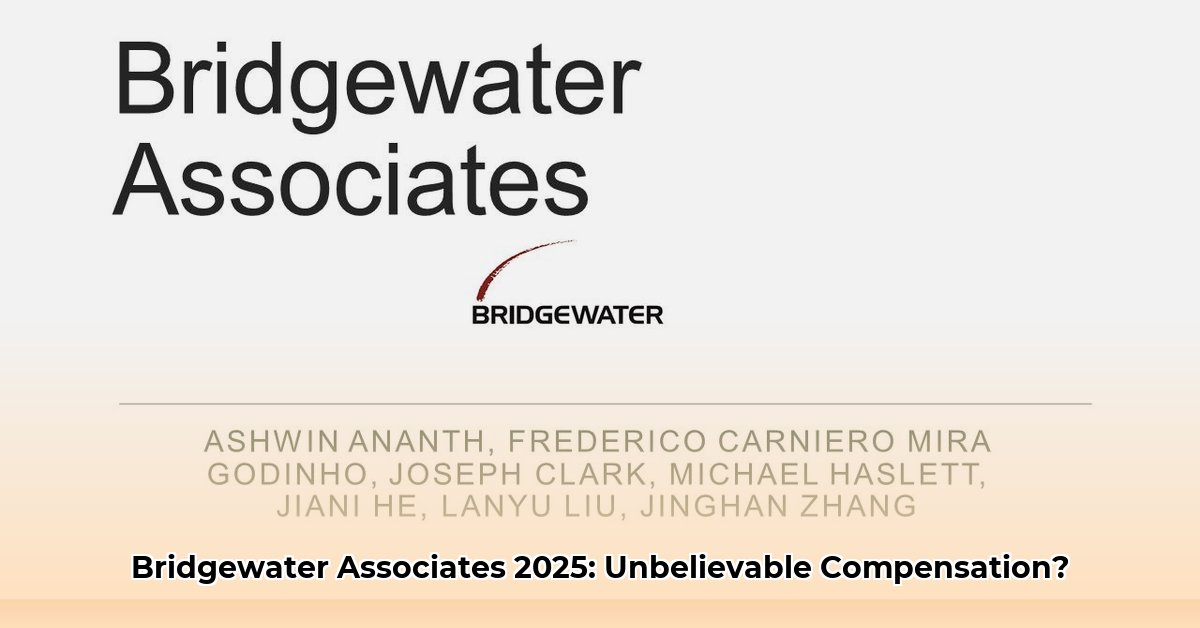
Bridgewater Associates Compensation: Decoding the Paychecks
Understanding compensation at Bridgewater Associates in 2025 requires a nuanced approach. Salaries are far from uniform, varying significantly based on several key factors. Think of it as a tiered system, with higher positions and experience levels commanding significantly greater compensation.
Factors Influencing Bridgewater Compensation
Several factors contribute to the variability of compensation at Bridgewater Associates:
- Role: Investment Associates and management roles generally earn more than those in technology or administrative positions, reflecting the firm's investment-centric focus.
- Experience: Seniority plays a substantial role, with more experienced employees typically earning higher salaries.
- Performance: Bridgewater, like many firms, likely utilizes strong performance-based bonuses and incentives, significantly impacting total compensation.
Publicly available data, such as that found on Glassdoor, provides a partial picture. These sources often omit crucial details, such as bonuses, stock options, and comprehensive benefits packages, thus underrepresenting actual earnings. Therefore, it's crucial to view publicly available data with a critical eye and seek additional, more complete sources. Does the allure of a high base salary alone truly reflect the full picture? Consider the full cost of the long hours.
Bridgewater Compensation: What We Know and Don't Know
While general salary ranges are discernible (experienced professionals earn more than entry-level employees), significant gaps remain in our understanding of the complete compensation structure. The lack of transparency regarding performance-based incentives and the full scope of benefits presents a major challenge for precise analysis.
Ongoing research aims to clarify these ambiguities. Some experts suggest the compensation system reflects a meritocratic model, rewarding individual contributions. Others propose a more complex system incorporating both merit and seniority. How does this uncertainty influence your approach to compensation at Bridgewater? A clearer picture is vital.
Actionable Insights: Understanding Your Compensation Potential
This information can be leveraged strategically depending on your relationship with Bridgewater Associates:
For Potential Employees:
- Thorough Research: Go beyond online resources. Investigate specific roles, compare advertised salaries with industry averages, and actively network with current or former Bridgewater employees to gain a more complete understanding.
- Long-Term Career Planning: Analyze potential career paths and associated pay increases within Bridgewater. Prioritize areas with growth potential, such as advanced analytics and software development, which are likely to offer higher earnings in the future.
For Current Employees:
- Compensation Review: Regularly compare your compensation package with industry standards for comparable roles and experience levels. Prepare a strong case to negotiate your salary based on your performance and market value.
- Professional Development: Identify areas for professional development that can lead to higher compensation. Actively pursue promotions and increased responsibilities.
For Compensation Analysts/HR Professionals:
- Benchmarking: Closely follow salary trends at Bridgewater and competing firms. Refine compensation models using the most complete available data.
- Comprehensive Modeling: Develop models that accurately account for all compensation components, including bonuses, stock options, and benefits.
Risks of Relying on Incomplete Compensation Data
Relying on incomplete data when assessing Bridgewater's compensation carries significant risks:
| Risk Factor | Likelihood | Potential Impact | Mitigation Strategies |
|---|---|---|---|
| Inaccurate Salary Data | Moderate | Misinformed salary expectations; poor negotiation outcomes | Cross-reference data across multiple sources; use industry benchmarks. |
| Underestimation of Total Pay | High | Underestimation of career value; missed financial opportunities | Account for bonuses, stock options, and benefits in your analysis. |
| Difficulty Comparing Compensation | High | Difficulty assessing true compensation competitiveness | Develop sophisticated models; use total compensation as the primary metric. |
How to Negotiate Your Bridgewater Associates Salary
Key Takeaways:
- Bridgewater's compensation varies significantly by role, experience, and potentially department.
- Base salaries average around $120,000, but bonuses substantially impact total compensation, potentially increasing total compensation to $160,000 or more for top performers and significantly lower for some.
- Significant discrepancies exist between different data sources (e.g., Glassdoor and Wall Street Oasis), necessitating cautious interpretation and the utilization of multiple sources.
- Thorough preparation is crucial for effective salary negotiation.
Navigating the Bridgewater Salary Negotiation Landscape
Effective negotiation requires meticulous preparation and a strategic approach:
- Research: Begin by thoroughly researching your target role using reputable sources. Acknowledge the limitations of each source.
- Define Your Target: Establish your desired salary range, considering your experience, skills, and the specifics of the role. Consider using multiple data points and weighting them according to their reliability.
- Network: Connect with individuals familiar with Bridgewater's compensation practices for valuable insights. This insider knowledge can significantly improve your negotiation position.
- Prepare Your Case: Highlight accomplishments and demonstrate how your skills align with Bridgewater's needs. Quantify contributions whenever possible.
- Strategic Negotiation: Approach the negotiation confidently yet flexibly. Remember it is a discussion, not a demand. Consider the long-term implications, including work-life balance and total compensation.
Sectoral Variations and Data Caveats
Reported data indicates significant compensation differences across Bridgewater's various sectors. Hedge fund roles typically offer higher average compensation than other departments. However, the data's limitations are crucial:
- Data Ambiguity: The exact definitions and methodologies used to categorize sectors remain unclear.
- Self-Reported Data: The data's reliance on self-reported information can lead to underrepresentation or omission of crucial compensation elements like stock options and profit sharing. Multiple reliable sources are necessary.
- Geographical Variations: Geographical location can impact salaries, but this information is often absent from publicly available data.
Long-Term Compensation Outlook
Predicting future compensation trends requires analyzing Bridgewater's performance, industry benchmarks, and broader economic conditions. Continuous monitoring and research are essential to stay ahead in salary negotiations.